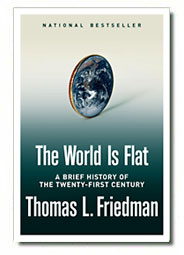
The World Is Flat A Brief History of the Twenty-First Century
For a list of Thomas Friedman'srecent "Foreign Affairs" columns for The New York Times, click here.
Visit "Tom's Journal" on The NewsHour with Jim Lehrer.
Join Mailing List
April 2005 Published byFarrar, Straus and Girouxhardcover; 496 pagesISBN: 0374292884
History of the world twenty years from now, and they come to the chapter "Y2K to March 2004," what will they say was the most crucial development? The attacks on the World Trade Center on 9/11 and the Iraq war? Or the convergence of technology and events that allowed India, China, and so many other countries to become part of the global supply chain for services and manufacturing, creating an explosion of wealth in the middle classes of the world's two biggest nations, giving them a huge new stake in the success of globalization? And with this "flattening" of the globe, which requires us to run faster in order to stay in place, has the world gotten too small and too fast for human beings and their political systems to adjust in a stable manner?
In this brilliant new book, the award-winning New York Times columnist Thomas Friedman demystifies the brave new world for readers, allowing them to make sense of the often bewildering global scene unfolding before their eyes. With his inimitable ability to translate complex foreign policy and economic issues, Friedman explains how the flattening of the world happened at the dawn of the twenty-first century; what it means to countries, companies, communities, and individuals; and how governments and societies can, and must, adapt. The World Is Flat is the timely and essential update on globalization, its successes and discontents, powerfully illuminated by one of our most respected journalists.
Reviews"Before 9/11, New York Times columnist Friedman was best known as the author of The Lexus and the Olive Tree, one of the major popular accounts of globalization and its discontents. Having devoted most of the last four years of his column to the latter as embodied by the Middle East, Friedman picks up where he left off, saving al-Qaeda et al. for the close. For Friedman, cheap, ubiquitous telecommunications have finally obliterated all impediments to international competition, and the dawning 'flat world' is a jungle pitting 'lions' and 'gazelles,' where 'economic stability is not going to be a feature' and 'the weak will fall farther behind.' Rugged, adaptable entrepreneurs, by contrast, will be empowered. The service sector (telemarketing, accounting, computer programming, engineering and scientific research, etc.), will be further outsourced to the English-spoken abroad; manufacturing, meanwhile, will continue to be off-shored to China. As anyone who reads his column knows, Friedman agrees with the transnational business executives who are his main sources that these developments are desirable and unstoppable, and that American workers should be preparing to 'create value through leadership' and 'sell personality.' This is all familiar stuff by now, but the last 100 pages on the economic and political roots of global Islamism are filled with the kind of close reporting and intimate yet accessible analysis that have been hard to come by. Add in Friedman's winning first-person interjections and masterful use of strategic wonksterisms, and this book should end up on the front seats of quite a few Lexuses and SUVs of all stripes." --Publishers Weekly (starred review)
